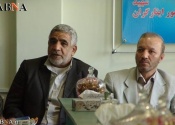Iran must withdraw 'occupying' forces from Syria: Saudi
#SyriaWarSaudi FM says Iran has to pull its forces out of Syria if Tehran wants to be part of the solution to the conflict in the Arab country

Iran must withdraw its "occupying" forces from Syria to help resolve that country's conflict, Saudi Foreign Minister Prince Saud al-Faisal said Monday after talks with his German counterpart.
"Our reservations are about Iran's policy in the region, not about Iran as a country or people," Prince Saud said at a joint press conference in the Red Sea city of Jeddah with Germany's Frank-Walter Steinmeier.
"In many conflicts, Iran is part of the problem, not the solution," Prince Saud said, adding that Iran had forces in Syria "fighting Syrians."
"In this case, we can say that Iranian forces in Syria are occupying forces," aiding President Bashar al-Assad, whom he described as an "illegitimate" leader.
Saudi Arabia and other Gulf states support some rebel groups.
Assad receives financial and military aid from Iran, which denies having fighters on the ground despite Iranian media reports that suggest the contrary.
Assad is also backed by combatants from Lebanon's pro-Iranian Shiite movement Hezbollah.
"If Iran wants to be part of the solution in Syria, it has to pull its forces from Syria. The same applies elsewhere, whether in Yemen or Iraq," the Saudi minister said.
'Part of the problem'
"If it wants to be part of the solution, welcome. But if it continues to be part of the problem, it cannot play any role in the region."
Iran is also accused of backing Yemeni Shiite rebels who overran Yemen's capital Sanaa on September 21.
The governments of Iran and Iraq have grown closer security since the toppling of Saddam Hussein in the 2003 US-led invasion of Iraq.
Among the many groups fighting Assad is the Islamic State (IS) group, which Saudi Arabia and four other Arab states are now battling under a US-led coalition.
The Arab nations have taken part in or given support to coalition air strikes against IS militants in Syria.
IS extremism "has nothing to do with Islam", Saudi King Abdullah said last week.
Steinmeier said the IS was "a threat to the entire world", noting that thousands of foreign fighters, including young Germans, had joined up.
"We agree on the fact that we must work together against IS," the German minister said, adding that a military approach must be part of a political strategy.
Syria's civil war began in March 2011 as a peaceful protest movement inspired by the Arab Spring and demanding Assad's ouster, but morphed into a brutal war after pro-Assad forces unleashed a massive crackdown against dissent.
The war has resulted in the deaths of an estimated 191,400 people, and displaced roughly half of the country's population, according to the UN.
The majority of fatalities are reportedly of civilians, primarily killed by pro-Assad forces, although other groups are also implicated.




1 Comment
Hide Comments